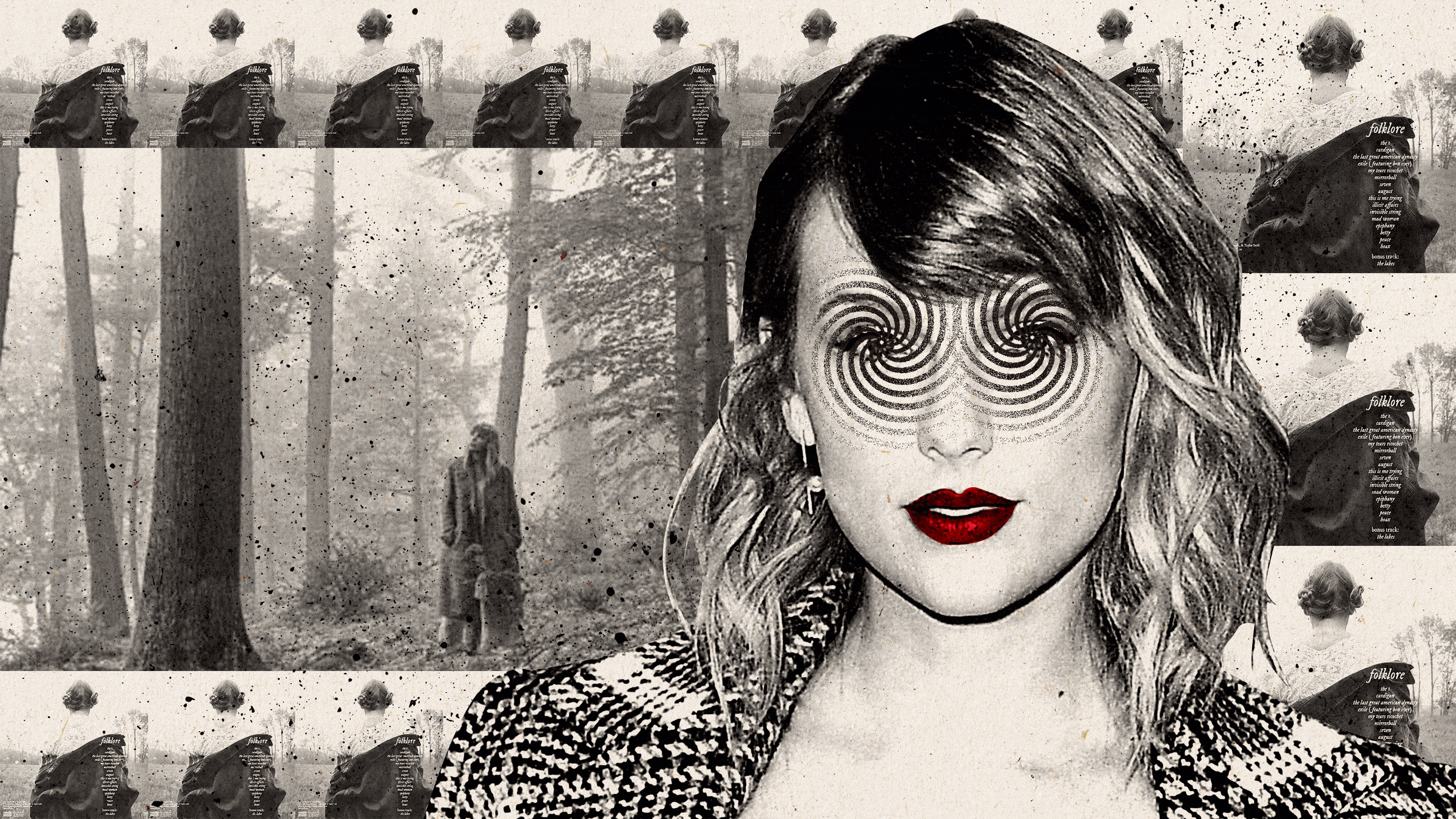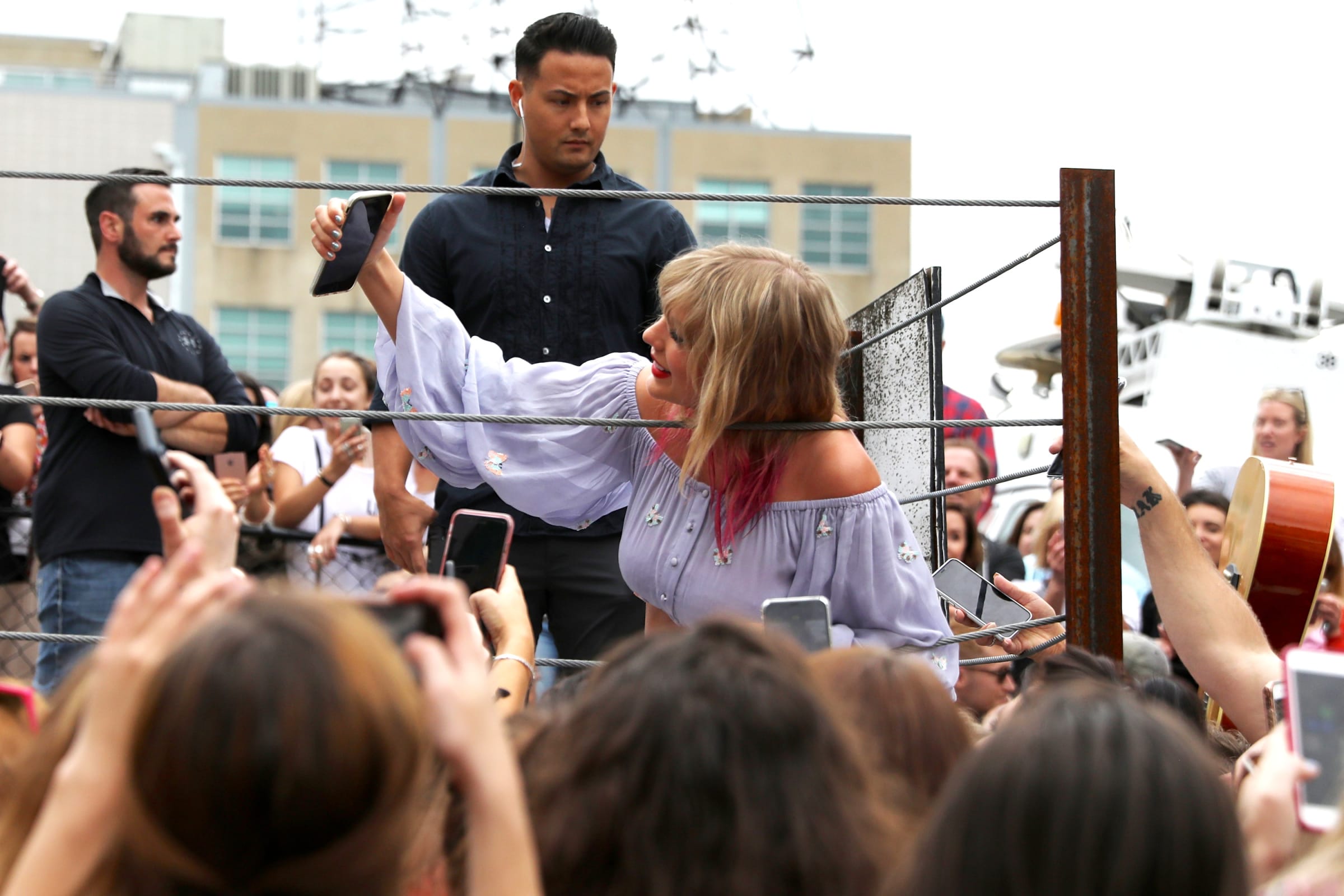Taylor Swift Remains Silent as Fans Doxx and Harass Music Critic Over ‘Folklore’ Review

Photo Illustration by Elizabeth Brockway/The Daily Beast/Getty
Fans tweeted a Pitchfork editor’s address and phone numbers—and even photos of her and her home—all over a review some zealous Swifties decided was not positive enough.
The calls started around 2 in the morning—an hour after Pitchfork senior editor Jillian Mapes’ review of Taylor Swift’s eighth album, Folklore, posted on the site. It was a largely positive review. But it was not positive enough for a certain subset of fans, who began to use some of the internet’s dirtiest and most dangerous tactics to harass the writer who’d dared to scorn their queen with insufficient praise.
Mapes’ even-handed review deftly and artfully expressed Folklore’s strengths and weaknesses—and given Pitchfork’s historical skepticism toward popular artists, the piece might as well have been a rave.
But certain lines didn’t sit well with Swift’s most rabid fans. And perhaps more importantly, the 8.0 numerical score that accompanied Mapes’ review—a metric determined not by the reviewer, but from multiple staffers’ ratings—threatened to drag down the album’s aggregated Metacritic score.
That, apparently, was an intolerable insult.
Various tweets, some of which have now been deleted or removed and some of which still remain, included Mapes’ address and phone numbers old and current. Some have included photos of Mapes and even her home. Users have “joked” about burning her house. Others have posted screenshots of a Halsey tweet responding to a bad review earlier this year—in which the singer wrote, “can the basement that they run p*tchfork out of just collapse already.” Halsey deleted the tweet at the time after realizing that Pitchfork is, in fact, run out of One World Trade Center.
Swift’s representative did not respond to multiple requests for comment.
Despite these fans’ insistence that their concern is the fairness and quality of the reviews Folklore receives, they really appear fixated on the album’s Metacritic score. Specifically, many lamented the possibility that Folklore could drop below a 90. At the time of writing, the album’s Metascore is an 89.
Music stans have begun using elaborate methods to boost new releases from their favorite artists in recent years. They coordinate streaming parties and create hours-long playlists and pool money to buy as many fans digital copies of new releases as possible. All of this aims to boost albums’ and songs’ chart positions by getting as many people listening for as many hours as possible, on as many platforms as possible.
But in targeting a journalist like this, some fans have taken things to a dangerous extreme. And perhaps more importantly, this is not the first time that Swift’s most zealous fans have used doxxing and death threats to punish people they feel have wronged her.
Last fall, after Swift urged her followers to “let Scott Borchetta and Scooter Braun know how you feel” about their efforts to keep her from using and performing old hits, her fans doxxed both men.
Swift’s request might have seemed reasonable to some at the time, given the rights issues at hand. But doxxing is more than an innocent prank, and both Instagram and Twitter have policies prohibiting the practice. Once a person’s private information has been distributed, it’s impossible to make it private again—and given the potentially lethal ways it can be used, that’s a harrowing prospect.
On another occasion last summer, furious Swifties also sent death threats and racial slurs to comedians Desus and Mero for “body-shaming” Swift with a joke about the singer having a “very long back.”
As Mero told The Daily Beast’s Matt Wilstein, “The FBI called my house. Well actually, they called my local precinct... Somebody had sent me a message saying, ‘I know you have four kids and I know where they go to school.’ And I screen-grabbed it and I was like, ‘I wish you would, motherfucker! Come to my house, I got a rusty machete waiting for you.’”
Swift does not appear to have commented on these incidents, either.
Musicians have faced backlash in recent years for attacking critics they felt had done them wrong. Last year, Lana Del Rey and Lizzo both drew ire when they attacked critics over reviews they didn’t like. But this case stands out both because the fans themselves are behind the attacks and, most confusingly, did so over a largely positive review.
Despite the real and genuinely frightening harassment Mapes has received—including, as she noted in a series of tweets posted Tuesday, repeated phone calls and physical threats—these fans have largely laughed at articles and social media users calling them out for their behavior. As one fan put it, “our impact is unmeasurable it’s so funny pls.”

Taylor Swift surprises fans on April 25, 2019 in Nashville, Tennessee.
Leah Puttkammer/Getty
“tell me people don’t actually take ‘threats’ from swifties seriously- half of us are depressed and the other half are dumb do y’all really think we’re gonna hurt you in any way,” another account wrote.
But when threats come from faceless Twitter accounts, and are accompanied by real harassment, it’s hard to know how any writer is supposed to determine what is and is not a legitimate threat. Especially as newsroom shootings and threats of violence against journalists become the norm, making light of threatening to burn down a writer’s home is a callous, juvenile “joke” at best.
In this context, Swift’s continued silence essentially becomes tacit permission for her fans to continue harassing anyone they please. It’s perhaps not the best look for a pop star who once had a hit all about overcoming bullying—and who last year wrote about fearing for her safety after her personal information was repeatedly shared online.
In a tweet posted Tuesday, Mapes wrote that she’s received “more Twitter threats to roll up and harm me than I could stomach to go through.”
“I’ve gotten too many emails saying some version of, ‘you are an ugly fat bitch who is clearly jealous of Taylor, plz die,’” Mapes wrote in a thread, “which is not the first time I’ve heard that from pop stans...It sucks to be scared of every person milling about outside or feel like you can’t answer the phone. That said, I am safe and doing fine.”
Mapes wrote that her posts were not meant to deride “the Swiftie hive,” but to clarify what had actually happened to prevent misinformation from spreading. (Mapes declined to comment for this story, but provided The Daily Beast permission to quote her tweets as her account remains private.) And indeed, it’s worth noting that Swift fans themselves have, in many cases, joined in urging their fellow fans against spreading misinformation and apologized on behalf of the broader fandom.
It’s understandable that longtime Swift fans might be a little sensitive about how their favorite artist is perceived and ranked compared to other artists. For a long time, she and her music could often be dismissed as teenage fluff for screaming tweens. In some arenas, that stereotype prevails.
But pop has since risen to astronomical influence since Swift’s earlier years, and garnered more serious consideration than in years past. And especially since 1989, netting her a second Album of the Year Grammy, critics have taken Swift seriously as an artist and lyricist. The fact that Pitchfork, which once made a habit of ignoring pop artists altogether, even bothered to review Folklore—and then gave the album a solid 8.0—expresses that fact better than perhaps anything. So in the words of Swift herself: Anyone throwing temper tantrums on her behalf needs to calm down.
